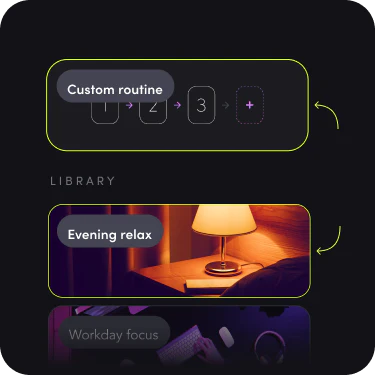Introduction
Imagine walking into your home after a long day, and with a simple voice command, your lights dim, your favorite music starts playing, and the thermostat adjusts to the perfect temperature. Sounds like a dream? Well, with voice assistants like Amazon Alexa, Google Assistant, and Apple’s Siri, this is now a reality. Voice assistants have transformed smart homes, making them more efficient, convenient, and interactive. But what exactly are the benefits of integrating a voice assistant into your smart home setup? Let’s dive in!
1. Effortless Hands-Free Control

One of the biggest advantages of voice assistants is their hands-free functionality. Whether you’re cooking, cleaning, or carrying groceries, you can control various smart home devices without lifting a finger. Simply say, “Hey Google, turn on the lights,” or “Alexa, play my playlist,” and let the magic happen.
2. Seamless Home Automation

Voice assistants work as the central hub for home automation. They can control multiple smart devices, including:
- Lighting systems (Philips Hue, LIFX)
- Smart thermostats (Nest, Ecobee)
- Security systems (Ring, Arlo)
- Smart locks (August, Schlage)
- Entertainment systems (Fire TV, Chromecast, Sonos)
By integrating these devices with a voice assistant, you create a fully automated home experience.
3. Increased Energy Efficiency
Want to save on your energy bills? Voice assistants help optimize energy consumption by controlling smart thermostats, lights, and appliances. You can set schedules, adjust settings remotely, and even receive energy usage reports. Saying, “Alexa, turn off all the lights,” before bed can make a real difference.
4. Enhanced Home Security
Security is a top priority for any homeowner. Voice assistants enhance security by:
- Locking doors remotely
- Checking security camera feeds
- Setting up automated lighting to deter intruders
- Notifying you of security alerts
With just a voice command, you can check if your doors are locked or turn on security cameras when you’re away.
5. Personalized User Experience
Voice assistants learn your preferences over time. They can suggest music, adjust lighting based on your routine, or even remind you about upcoming appointments. Features like voice recognition allow personalized responses for different household members.
6. Entertainment at Your Command
Want to listen to your favorite podcast while cooking? Or stream Netflix hands-free? Voice assistants make entertainment seamless. You can:
- Play music, audiobooks, and podcasts
- Control smart TVs and speakers
- Adjust volume and playback settings
Simply say, “Hey Siri, play my favorite jazz playlist,” and let the good vibes flow.
7. Improved Accessibility
For elderly individuals or those with disabilities, voice assistants can be life-changing. They provide hands-free assistance for:
- Making emergency calls
- Controlling smart home devices
- Setting medication reminders
- Providing news, weather, and general information
This level of accessibility fosters independence and convenience.
8. Time-Saving Convenience
Smart homes with voice assistants help you save time by:
- Setting timers and alarms
- Providing real-time traffic updates
- Managing to-do lists and calendars
- Answering questions instantly
Instead of manually searching for information, just ask your assistant, “What’s the weather today?” and get an instant response.
9. Integration with Third-Party Apps

Voice assistants support various third-party integrations, enhancing functionality. You can:
- Order food via Uber Eats
- Control fitness apps
- Check your bank balance
- Manage grocery lists
The possibilities are endless!
Unveiling the Profound Differences Between the Old Testament and the New Testament
10. Enhanced Shopping Experience
Love online shopping? Voice assistants make it easier by:
- Adding items to your shopping list
- Placing Amazon or Walmart orders
- Tracking package deliveries
With a simple command like, “Alexa, reorder my favorite coffee,” your essentials are just a voice request away.
11. Multi-Room Control

One of the coolest features of voice assistants is multi-room control. You can:
- Play synchronized music in multiple rooms
- Broadcast messages across smart speakers
- Control different zones of your home independently
This feature is perfect for large homes or families who love music and seamless communication.
12. Health and Fitness Assistance
Want a fitness buddy? Your voice assistant can:
- Guide you through workout routines
- Provide healthy recipes
- Remind you to drink water
- Track your daily steps (if integrated with fitness devices)
It’s like having a virtual personal trainer at your service.
13. Future-Proofing Your Home
Smart home technology is evolving, and voice assistants are at the forefront. By integrating them now, you ensure your home remains up-to-date with future advancements.
14. Cost-Effective Solution
Many smart home devices can be pricey, but voice assistants provide a cost-effective way to control multiple devices through a single hub. Instead of buying separate remotes or controllers, your voice assistant does it all.
White Nationalism and Online Radicalization: Unmasking the Alt-Right
15. Customization and Routines

Voice assistants allow you to create custom routines. For example:
- Saying “Good morning” can turn on the lights, start the coffee machine, and read the news.
- Saying “Goodnight” can lock doors, turn off lights, and lower the thermostat.
This level of automation enhances comfort and efficiency.
Conclusion
Integrating a voice assistant into your smart home is more than just a tech upgrad it’s a lifestyle transformation. From convenience and security to energy savings and entertainment, the benefits are endless. As voice technology continues to evolve, smart homes will only become smarter, making everyday life more effortless and enjoyable. Ready to experience the future? Just say, “Hey Alexa, let’s get started!”
FAQs
1. Which voice assistant is best for a smart home?
The best voice assistant depends on your ecosystem. Amazon Alexa is great for smart home control, Google Assistant excels in AI responses, and Apple’s Siri integrates well with Apple devices.
2. Can I use multiple voice assistants in one home?
Yes, you can use multiple voice assistants, but they may not work seamlessly together. Some smart hubs support integration between different assistants.
3. Are voice assistants always listening?
Voice assistants are designed to listen only when activated by their wake word (e.g., “Hey Google”). You can disable listening features for added privacy.
4. Do voice assistants work without the internet?
Most voice assistants require an internet connection to process commands, though some basic local functions (like controlling Bluetooth devices) may work offline.
5. Can I integrate a voice assistant with my existing smart home devices?
Yes, but ensure compatibility. Most major smart home brands support integration with Alexa, Google Assistant, or Siri. Check your device specifications before setting up.

